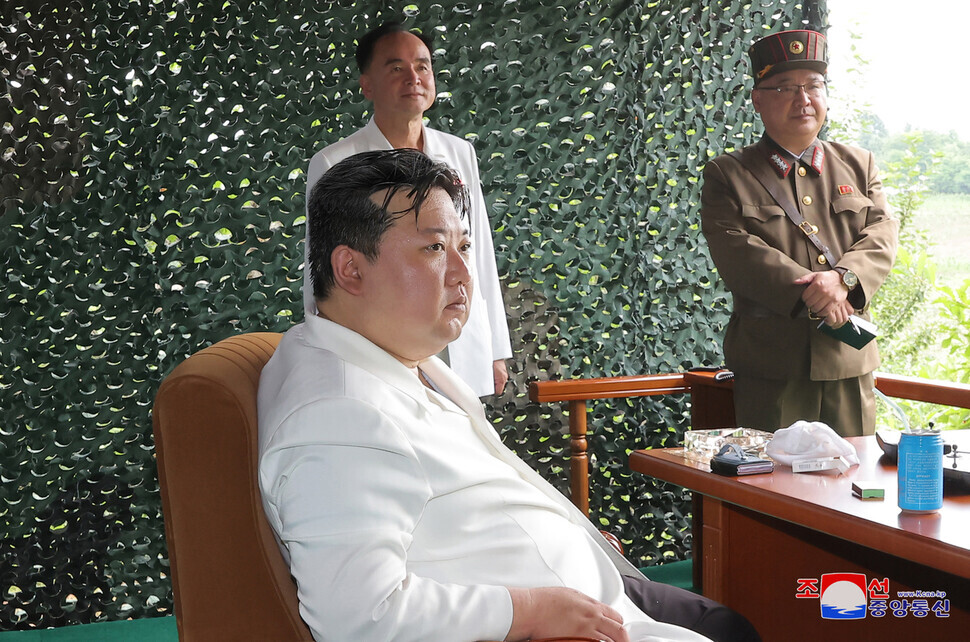hankyoreh
Links to other country sites 다른 나라 사이트 링크
What’s in a name? What to make of N. Korea’s mixed use of “ROK” and “south Korea”

Attention focused on the use of the term “ROK” by North Korea's Kim Yo-jong to refer to South Korea in two commentaries on Monday and Tuesday, while Kim Jong-un used the traditional term “south Korea” while personally overseeing the second test launch of the Hwasong-18 intercontinental ballistic missile (ICBM) on Wednesday.
Questions abound about whether this is merely a conflation of the two terms, a signal of a return to traditional usage, or something else entirely — perhaps even the confusion that arises during a transitional period.
On Thursday, North Korea’s Rodong Sinmun reported that during the launch of the ICBM, Kim Jong-un stated that “a series of stronger military offensives will be launched until the US imperialists and the south Korean puppet traitors admit the shameful defeat of their useless hostile policy toward the DPRK in despair and give up their policy.”
What’s noteworthy here is Kim’s use of the term, “south Korean puppet traitors” after Kim Yo-jong used “ROK” — short for Republic of Korea, South Korea’s official name — in two previous press statements directed at the US and South Korea, which were both delivered “upon authorization.”
“Upon authorization” implies that the “authorization” was officially from the Workers’ Party of Korea Central Committee, and in fact from its general secretary, Kim Jong-un.
Furthermore, the press statement of the DPRK Foreign Ministry department director-general, released on the first of the month read, “It is the policy of the DPRK government that entry by any personage of south Korea into its territory can not be allowed,” implying that South Korea is a “foreign country.”
That statement, followed by the use of “ROK” by Kim Yo-jong, has led the South Korean government to infer that North Korea is considering the inter-Korean relationship to be a relationship between two different countries, rather than as a special relationship oriented toward unification.
What should we make of Kim Jong-un’s use of “south Korea” and Kim Yo-jong’s use of “ROK”?
First, we should note the difference between the mediums that each statement ran in, the Rodong Sinmun and Korean Central News Agency (KCNA).
Kim Yo-jong’s remarks were published only in the outward-facing KCNA, which is not accessible to the general North Korean public.
On the other hand, Kim Jong-un’s remarks about the Hwasong-18 launch were published in both the KCNA and the Rodong Sinmun, North Korea’s most official newspaper and a must-read for locals.
The newspaper did not use the term “ROK” before or after Kim Yo-jong’s statements, but continued to use existing expressions such as “the Korean people” and “south Korea” as before.
Kim Jong-un has been using the phrase “south Korean puppet traitors” ever since he emphasized the “anti-US spirit and approach to the south and the enemy” in a speech at a July 27, 2022, event to commemorate the 69th anniversary of the “Day of Victory” in the Great Fatherland Liberation War, as the North refers to the day the armistice was signed ending hostilities during the Korean War.
Kim Yo-jong also used the phrase “south Korean puppet military group” instead of “ROK” in her press statement on Monday.
In short, neither Kim Jong-un nor Kim Yo-jong has used the official name of the South in statements and presentations to the North Korean public, except in the context of talks or agreements between North and South Korean authorities.
“Since Kim Jong-un came to power in 2012, there has been a clear trend of strengthening ‘unitary statehood’ in North Korea, it remains to be seen whether it will go as far as treating the south as a foreign country rather than a ‘unification-oriented special relationship,’” said a former senior government official, declining to reach conclusions.
By Lee Je-hun, senior staff writer
Please direct questions or comments to [english@hani.co.kr]

Editorial・opinion
![[Editorial] Intensifying US-China rivalry means Seoul must address uncertainty with Beijing sooner than later [Editorial] Intensifying US-China rivalry means Seoul must address uncertainty with Beijing sooner than later](https://flexible.img.hani.co.kr/flexible/normal/500/300/imgdb/original/2024/0517/8117159322045222.jpg) [Editorial] Intensifying US-China rivalry means Seoul must address uncertainty with Beijing sooner than later
[Editorial] Intensifying US-China rivalry means Seoul must address uncertainty with Beijing sooner than later![[Column] When ‘fairness’ means hate and violence [Column] When ‘fairness’ means hate and violence](https://flexible.img.hani.co.kr/flexible/normal/500/300/imgdb/original/2024/0516/7417158465908824.jpg) [Column] When ‘fairness’ means hate and violence
[Column] When ‘fairness’ means hate and violence- [Editorial] Yoon must stop abusing authority to shield himself from investigation
- [Column] US troop withdrawal from Korea could be the Acheson Line all over
- [Column] How to win back readers who’ve turned to YouTube for news
- [Column] Welcome to the president’s pity party
- [Editorial] Korea must respond firmly to Japan’s attempt to usurp Line
- [Editorial] Transfers of prosecutors investigating Korea’s first lady send chilling message
- [Column] Will Seoul’s ties with Moscow really recover on their own?
- [Column] Samsung’s ‘lost decade’ and Lee Jae-yong’s mismatched chopsticks
Most viewed articles
- 1[Editorial] Transfers of prosecutors investigating Korea’s first lady send chilling message
- 2[Exclusive] Unearthed memo suggests Gwangju Uprising missing may have been cremated
- 3[Column] US troop withdrawal from Korea could be the Acheson Line all over
- 4Xi, Putin ‘oppose acts of military intimidation’ against N. Korea by US in joint statement
- 5[Column] When ‘fairness’ means hate and violence
- 6[Editorial] Intensifying US-China rivalry means Seoul must address uncertainty with Beijing sooner t
- 7Spotlight turns to Hyundai Group Chairwoman’s visit to North Korea
- 8China, Russia put foot down on US moves in Asia, ratchet up solidarity with N. Korea
- 9‘Shot, stabbed, piled on a truck’: Mystery of missing dead at Gwangju Prison
- 10Records show how America stood back and watched as Gwangju was martyred for Korean democracy